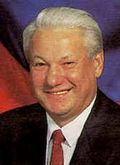Member of the Communist Party from 1961, Boris El'cin served as secretary of the Communist Party Central Committee (1 Jul 1985 - 18 Feb 1986), first secretary of the Moscow party committee (24 Dec 1985 - 11 Nov 1987) and candidate member of the Politburo (18 Feb 1986 - 14 Feb 1988). He proved an able and determined reformer, but his criticism of the slow pace of reform and even General Secretary Mikhail Gorbachev estranged him from party ranks. El'cin was forced to resign in disgrace from the Moscow party leadership in 1987 and from the Politburo in 1988. El'cin was demoted to a deputy minister for construction but then staged the most remarkable comeback in Soviet history. A year later, on 29 May 1990, the 1st Congress of People's Deputies of the Russian SFSR elected him chairman of the Supreme Soviet against Gorbachev's wishes. In his new role, El'cin publicly supported the right of Soviet republics to greater autonomy within the Soviet Union, took steps to give the Russian republic more autonomy, and declared himself in favor of a market-oriented economy and a multiparty political system. In July 1990 El'cin quit the Communist Party. His victory in the first direct, popular elections for the presidency of the Russian republic (12 Jun 1991) was seen as a mandate for economic reform. In August 1991, El'cin consolidated political forces to prevent communists from returning to power in attempt to stage a coup in Moscow. Determined to destroy the communism in Russia and eliminate his chief opponent, Gorbachev, El'cin secured the signing of the Minsk treaties (7-8 Dec 1991) that established the Commonwealth of Independent States and put an end to the existence of the Soviet Union. As leader of the new independent country, El'cin aimed his politics at transforming the country's command economy. Early in 1992 he ended government price subsidies and controls over food and other consumer goods. At the same time, the Congress of People's Deputies, had grown increasingly hostile toward his free-market reforms. El'cin and the Congress were also deeply divided over the question of the balance of powers in Russia's proposed new constitution. On 21 Sep 1993, El'cin unconstitutionally dissolved the Congress and called for new parliamentary elections. In response, hard-line legislators declared El'cin to be removed from office (23 Sep 1993) and attempted to mount a coup in Moscow in early October but were suppressed by army troops. Parliamentary elections and a referendum on a draft constitution were held in December 1993. El'cin's draft constitution, which increased the powers of the presidency, was narrowly approved. In December 1994 El'cin sent Russian army troops into Chechnia to fight the separatists. The war in Chechnia and the failure of his free-market reforms dimmed El'cin's prospects for reelection to the presidency, but he won reelection in July 1996 for the 4-year term. He spent months recovering from a heart attack and had to undergo a cardiac surgery on 5 Nov 1996. Lowering living standards, military failures, worsening economic situation, corruption, crimes and other negative factors significantly decreased El'cin's popularity by the end of 1990's. The August financial crisis in 1996 stroke a blow against Russian middle class and weakened the country's credibility at world markets. Unable to conclude alliance with existing political parties, El'cin became increasingly depended on a small circle of his close advisors labeled by media The Family. This group determined the state policy and used its position to acquire property and wealth using dubious means. Deteriorating health aggravated by alcohol abuse distanced the president from making political decisions and caused political instability. In the fall of 1999, Russian troops again clashed with Chechen rebels, which invaded Dagestan and started the second Chechen war. Ineligible to run for the third presidential term, El'cin agreed to resign. On 31 Dec 1999, he announced his resignation on TV and handed over the presidency to his handpicked successor, Vladimir Putin, on the pretext that Russia needs a new political leader in the next millennium. Biography source: [2] |
| Candidate |
Popular vote (12 Jun 1991) |
% ballots cast |
| Boris El'cin |
45,552,041 |
57.30 |
| Nikolaj Ryžkov |
13,359,335 |
16.85 |
| Vladimir Žirinovskij |
6,211,007 |
7.81 |
| Aman-Gel'dy Tuleev |
5,417,464 |
6.81 |
| Al'bert Makašov |
2,969,511 |
3.74 |
| Vadim Bakatin |
2,719,757 |
3.42 |
| against all |
1,525,410 |
1.92 |
| invalid ballots |
1,716,757 |
2.16 |
| Candidate |
Popular vote (16 Jun 1996) |
% ballots cast |
Popular vote (3 Jul 1996) |
% ballots cast |
| Boris El'cin |
26,664,890 |
35.28 |
40,202,349 |
53.82 |
| Gennadij Zjuganov |
24,211,686 |
32.03 |
30,104,589 |
40.31 |
| Aleksandr Lebed' |
10,974,736 |
14.52 |
|
|
| Grigorij Javlinskij |
5,550,752 |
7.34 |
|
|
| Vladimir Zhirinovsky |
4,311,479 |
5.70 |
|
|
| Svjatoslav Fëdorov |
699,158 |
0.92 |
|
|
| Mihail Gorbačëv |
386,069 |
0.51 |
|
|
| Martin Šakkum |
277,068 |
0.37 |
|
|
| Jurij Vlasov |
151,282 |
0.20 |
|
|
| Vladimir Bryncalov |
123,065 |
0.16 |
|
|
| Aman-Gel'dy Tuleev |
308 |
0.00 |
|
|
| against all |
1,163,921 |
1.54 |
3,603,760 |
4.82 |
| invalid ballots |
1,072,120 |
1.42 |
780,592 |
1.05 |
|

